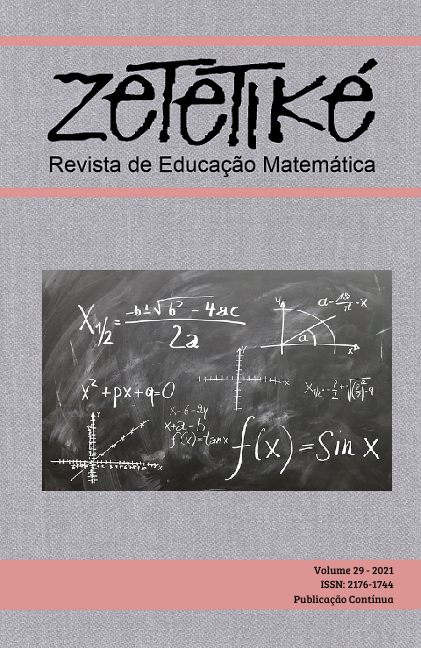Abstract
Over the last few years, there have been many discussions about teacher training, especially in regards to further education. Thus, this article presents partial data from the project “Creation of children's literature stories for the teaching of Mathematics”. It also presents an analysis of continuing educations for teachers from the early years of Elementary School. Our goal was to identify the knowledge of teachers from the early years of Elementary School in the process of creating stories for teaching the decimal numeral system. We used the Design Experiment methodology, and the theoretical framework used for the analysis was the Mathematics Teacher’s Specialised Knowledge - MTSK. In general, we identified that the training process for creating stories promotes teacher reflection, especially concerning the domain of Pedagogical Content Knowledge - PCK.
References
Alencar, E. S. (2019), Literatura infantil para o ensino de Matemática como recurso para a formação de professores. Belém: Editora Twee
Alencar, E. S., & Silva, R. J. (2017). A Literatura Infantil na Educação Matemática inclusiva. Educação Matemática em Revista-RS, 3(18), 68–74.
Brasil (1997). Ministério da Educação e Cultura. Parâmetros curriculares nacionais de matemática. Brasilia: MEC/SEB.
Brasil (2017). Base Nacional Comum Curricular. Versão preliminar. Brasília: MEC/SEB.
Carrillo-Yañez, J., Climent, N., Montes, M., Contreras, L.C., Flores-Medrano, E., Escudero-Ávila, D., …, & Muñoz-Catalán, M.C. (2018). The mathematics teacher’s specialised knowledge (MTSK) model. Research in Mathematics Education, 20(3), 236–253. DOI: 10.1080/14794802.2018.1479981
Carey, D. A. (1992). The Patchwork Quilt: A Context for Problem Solving. Arithmetic Teacher, 40(4), 199–203.
Cobb, P., Confrey, J., Di Sessa, A., Lehrer, R., E., & Schauble, L. (2003). Experimentos de design em pesquisa educacional. Pesquisador Educacional, 32(1), 9–3.
Galperin, C. (2013). Os desafios da escola pública do Paraná na perspectiva da professora PDE. Literatura e Inclusão Infantil. Curitiba. SEED-PR.
Flevares, L. M., & Schiff, J. R. (2014). Learning mathematics in two dimensions: A review and look ahead at teaching and learning early childhood mathematics with children’s literature. Frontiers in Psychology, 5, 1–12.
Hong, H. (1996). Effects of mathematics learning through children’s literature on math achievement and dispositional outcomes. Early Childhood Research Quarterly, 11(4), 477–494.
Kim, K. H., & Jung, Y. C. (2009). Apostando com o monstro. São Paulo. Editora Callis.
Kliman, M. (1993). Integrating mathematics and literature in the elementary classroom. Arithmetic Teacher, 40(6), 318–322.
Nurnberger-Haag, J., Alexander, A. N., & Powell, S. R. (2021). What counts in number books? A content-domain specific typology to evaluate children’s books for mathematics. Mathematical Thinking and Learning, 23(2), 145–169.
Ribeiro, M., Mamore, J.E., & Alencar, E.S. (2019). Lente teórica: mathematics teacher’s specialised knowledge – Mtsk. In E.S. Alencar (Ed.), Literatura infantil para o ensino de Matemática como recurso para a formação de professores (pp.49-64). Belém: Editora Twee.
Silva, A. C. (2012). Literatura infantil e a formação de conceitos matemáticos em crianças pequenas. Ciências & Cognição, 17(1), 37-57.
Toor, A., & Mgombelo J. (2015). Teaching mathematics through storytelling: Engaging the ’being’ of a student in mathematics. In K. Krainer, & N. Vondrová (Eds.) Proceedings of the Ninth Congress of the European Society for Research in Mathematics Education (pp. 3276-3282). Prague: Charles University.
Turkel, S., & Newman, C.M. (1988). What’s your number? developing number sense. Arithmetic Teacher, 35(6), 53–58.
Van Den Heuvel-Panhuizen, M., & Elia, I. (2012). Developing a framework for the evaluation of picturebooks that support kindergartners’ learning of mathematics. Research in Mathematics Education, 14, 17–47. DOI: 10.1080/14794802.2012.657437.
Zacarias, E., & Moro, M. L. F. (2005). A matemática das crianças jovens e literatura infantil. Educar, 25, 275–299.
Zazkis, R., & Liljedahl, P. (2009). Teaching Mathematics as Storytelling. Rotterdam/Taipei: Sense Publishers.
Welchman-Tischler, R. (1992). How To Use Children’s Literature To Teach Mathematics. Reston: NCTM.

This work is licensed under a Creative Commons Attribution-NonCommercial-NoDerivatives 4.0 International License.
Copyright (c) 2021 Zetetiké


